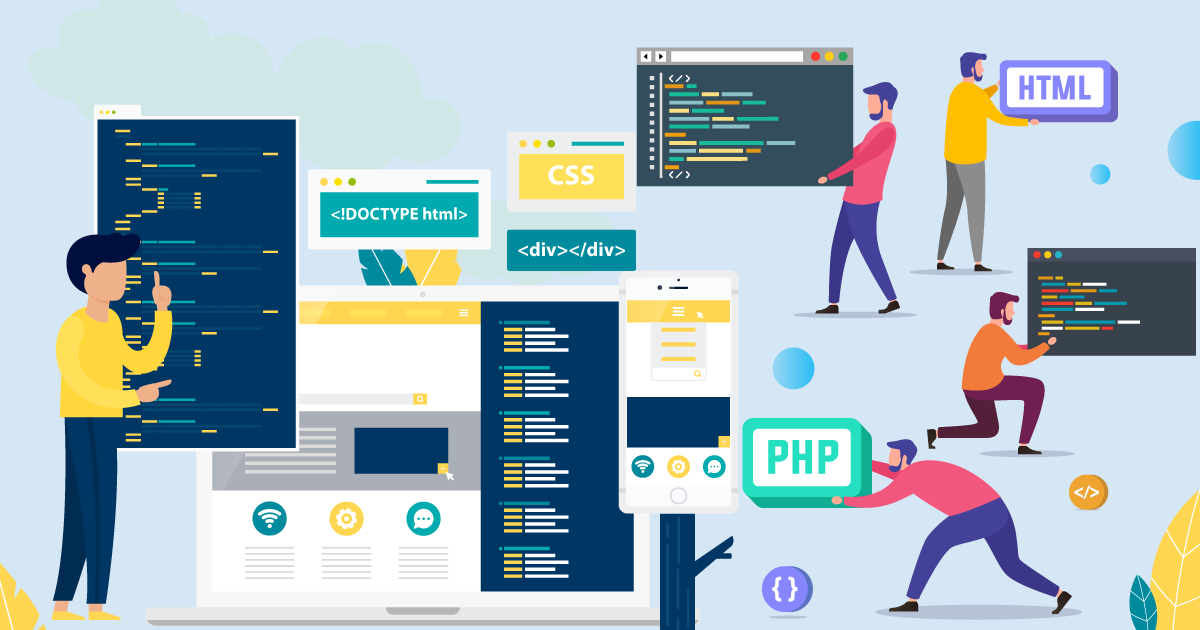The use of smartphones has given rise to the need to develop mobile applications. Whether it is for personal use or business purpose, contracting a development company requires big money. Not everyone has that.
Fortunately, you can now create your own app with the help of mobile app development software. You don’t need any prior coding experience or huge investments.
This mobile app development platforms help you build an app with the right framework. Let’s look at the top free and open-source mobile app development software that you can consider choosing.
Best Free and Open Source Mobile App Development Software
1. PhoneGap
PhoneGap is a popular open source mobile app development software that allows you to create hybrid applications. With PhoneGap, the developer doesn’t necessarily need to know mobile programming languages. Instead, they can get started with languages like CSS, HTML, and JavaScript for app creation.
In fact, it allows you to create apps that will work for multiple platforms with a single codebase to reach the maximum number of audience.

Features
- Easily integrates with various libraries for developing the app,
- Allows you to view and manage any changes in the app using PhoneGap
- Operates on multiple operating systems, including iPhone, Android, and Windows
Pros
- A single code base for multiple platforms
- Rapid testing and deployment
Cons
2. Flutter
Flutter is a free mobile app development software that is best suited for hybrid apps. It is one of the newest members in the mobile app development space and is written in C, C++, and Skia Graphics Engine.
It is Google’s UI toolkit that enables you to create applications for mobile, web, and desktop from a single codebase. What’s more, you don’t have to restart the application when testing your project. It offers the Hot Reload functionality, which makes the whole process of development stress-free and optimized.

Features
- Incorporate all critical platform differences such as navigation, scrolling, icons, and fonts
- Offers fully-customizable widgets to render fast development of native apps
- Creates plugins using channels to be easily used by every developer
Pros
- Expressive and flexible UI
- Builds native interfaces in minutes
Cons
- Not-so-rich library collections
3. Ionic
Ionic is another best free, open source mobile app development software mostly preferred for creating hybrid apps. The best thing is that it allows you to build applications for various platforms, including Android, iOS, and web — using a single codebase.
What’s more, it offers intuitive UI components that accelerate the app development process. Besides, it can be deployed virtually anywhere. Ionic boasts over 120 native device features, predefined elements, and a large community of developers.

Features
- Includes interactive paradigms, mobile components, typography, and an extensible base theme
- Written in JavaScript, the program is covered by the MIT license
- Allows for Cordova based app building
Pros
- Popular technologies and ease of learning
- Wide range of integration capabilities
Cons
4. Xamarin
Xamarin is a free and open source mobile app development application founded by Microsoft in 2011. It is a set of tools that enables developers to build apps for various operating systems, including Windows, Android, and iOS — all in one programming language.
One of the reasons why Xamarin is quite popular is that it uses the C# programming language. Besides, using the Xamarin Test Cloud, you can automatically test apps on around 2,000 real mobile devices.

Features
- Offers a real-time testing module to monitor and catch app errors as and when they happen
- Easily integrates with modern backend services, components, native APIs, and more
- Enables you to build stunning cross-platform user interfaces
Pros
- Full technical support by Microsoft
- The flexibility of C# and .NET
Cons
5. Buildfire
Another best in the category of free mobile app development software is Buildfire. It offers a robust set of tools to build apps for both Android and iOS. It is well-known for its high-end custom development capabilities as well as an easy, intuitive DIY platform.
What’s more, it currently supports more than 10,000 apps and is flexible enough to scale as your business starts to grow. You can’t ignore the simple and functional drag-and-drop UI either, as it makes it easy to build the app quickly.

Features
- Allows you to build custom functionality with their developer SDK
- Offer an interactive intuitive app builder where no coding is required
- Can be combined with any third-party API’s or pre-built integrations
Pros
- Includes advanced development features
- Has excellent social networking feature
Cons
- Not a reliable customer support
6. Felgo
Felgo is a free mobile app development software that supports apps for various platforms, including iOS, Android, desktop (Windows and Linux), and counting. Using a single codebase, you can create an application for different operating systems.
Well, it was ranked first as the most time-saving framework, easiest to learn, and best support system as compared to other 40 leading tools. Besides, it’s a great system to develop game apps as it supports 3D objects too.

Features
- Uses custom UI rendering to reduce the interaction between the native layer and runtime environment
- Provides a well-designed abstraction of platform-specific concepts
- Supports creating both business apps and gaming apps
Pros
- Easy to learn and use
- Smooth performance and fewer bugs
Cons
7. Appcelerator
Appcelerator is one of the leading mobile app development software that offers both paid and free versions. It enables developers to build a native mobile app using JavaScript, a popular scripting language.
Furthermore, you need fewer lines of code to develop apps as it allows for the reuse of codes across different platforms. The software supports multiple operating systems, including Windows, iOS, Android, and browser-based HTML5 applications.

Features
- Gives full and direct access to iOS and Android APIs using JavaScript
- Allows you to have a live view of all the changes being made in a preview window
- Its cloud capacity provides mobile-optimized access to any data source
Pros
- Rapid prototyping
- A single codebase for different platforms
Cons
8. Mobincube
Mobincube is a web-based application that enables users to create apps with no prior knowledge of any software programming language. It comes with a robust set of tools that lets you create mobile stores, customize every little detail, develop your own advanced functionalities, and more.
Besides, it has an excellent app interface, and you can use the software to create any kind of apps — entertainment, health, educational, and more.

Features
- Enables you to easily integrate third-party solutions within your app
- Allows you to deploy apps on various platforms like Amazon, Google Play, etc.
- Lets you add your own POIs on online maps
Pros
- High flexible
- Offers full customization
Cons
9. LongRange
LongRange is a native mobile application development tool that uses Cobol, CL, and RPG. It does not require one to know HTML, CSS, and JavaScript. It enables swift mobile application development and a short maintenance process. It comes with functionalities such as commands, form views, and navigation tabs.

Features
- Native app development with only CL/RPG/DDS
- Use mobile features such as camera, GPS, audio, SMS and more
- Push mobile app updates into devices automatically
Pros
- Reduced mobile app maintenance and extension costs
- Fast execution of native apps
Cons
- High level of dependency on existing tools for swift app development
10. Qt
Qt’s cross-platform framework allows you to design, develop, and deploy mobile applications cost-effectively for different types of portable, handheld iOS, Android, and Windows devices. The free and open-source platform provides a comprehensive and conducive development environment for delivering excellent user experiences. The time-honored and stable solution was initially used for developing software for Windows and Mac.

Features
- Support for opaque private keys
- Supports dual-mode networks and IPv6
- Buggy SSL server workarounds
Pros
- A large community of experienced developers and years of available documentation
- Compiler and parser optimization
Cons
- Increased process complexity owing to the meta-object compiler
11. Alpha Anywhere
Alpha Anywhere provides no-code and low-code environments for developing and deploying cross-platform web and mobile apps rapidly. It uses HTML and JavaScript to create apps that are also offline-capable. It is known as a comprehensive solution that supports mobile app development and desktop, web, and SaaS application development. It also comes with a massive library of tutorials that can speed you along the app development process.

Features
- Enterprise-grade HMAC data encryption and SSL support
- Offline-capable mobile app development
- Close-grained resource management delegation
Pros
- Pre-built modifiable sample applications that can also be used for reference or cross-verification
- Exhaustive backend access
Cons
- Limited technical support
12. Sencha Ext JS
Sencha Ext JS uses an MVC-based JavaScript framework to create highly responsive mobile applications that can elevate customer satisfaction. It facilitates the rapid design, development, and management of cross-platform, data-intensive applications compatible with all Android, iOS, and Windows devices. Mobile apps created with Sencha Ext JS have boasted of excellent business intelligence features that fuel data visualization and analytics.

Features
- Supported on WebKit browsers
- Excellent animations and enhanced touch events support
- Built-in, native-like themes for all major platforms
Pros
- Allows native API access and packaging using PhoneGap/Cordova
- Backend data package that can work independently with multiple data sources
Cons
- Not for those looking to develop apps with close to native functionality
Wrapping Up
While all the mobile application development tools featured on this page have their pros and cons, they all are capable of developing highly intelligent user-friendly and customer-focused mobile apps that have become the order of the day. Every project has its own unique requirements. We suggest you consider those as you zero in on a suitable mobile app software.
Need Any Technology Assistance? Call Pursho @ 0731-6725516




